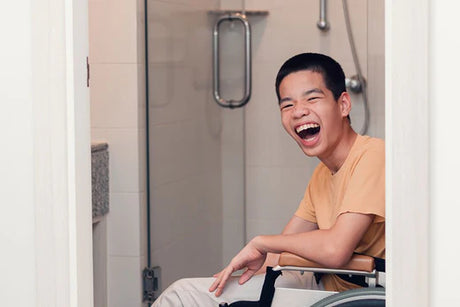
-
Welcome to our in-depth resource: for families supporting a disability
Welcome to our in-depth resource for families supporting a disability. Across the globe, well over 100 million people experience significant disability. This means that millions of families are navigating the challenges associated with mobility impairments and special needs.
A disability does not need to define a family, or completely dictate how the family operates day to day. In fact, a disabled loved one will often appreciate ‘normality’ over extra special attention. With the right combination of preparation, care, equipment and positive attitude, the whole family can go through the journey and create lifelong happy memories together.
This guide is designed to provide some insights around family life and disabilities, from teens to adult children to encountering disability for the first time. For any guidance specific to your family’s situation, consult with your occupational therapist or health provider.
-
![Image of the MODEL SB6c "Roll-inBuddy Lite", a versatile shower and commode chair designed for family use, highlighting its multiple functions and configurations.]()
MODEL SB6c “Roll-inBuddy Lite”: This is a popular all-rounder model for families. It not only makes a fantastic roll-in shower chair (as shown), but can be used as roll-over toilet chair. The SB6c also features a commode configuration when easy toilet access is not available.
Our Helpful Guides
-
![Image of a smiling adult in a wheelchair engaging with a standing person.]()
Guide To Parenting Disabled Adults
A lifelong disability, whether it’s mental, physical or both, demands that parents have the tools and support to help their children through all phases of life. We look at some of the elements of adult life that a disabled person might need support with, and how parents can avoid preventing their child’s progress as a happy, independent adult.
-
Tips For New Parents Of Disabled Children
Becoming a parent for the first time is unlike anything else. When that child is born with a disability or experiences a health or injury event at a young age, it can feel overwhelming for parents still getting their heads’ around parenting. In this guide we provide some handy tips for new parents to disabled children, based on our and our Showerbuddy families’ experiences.
Supporting A Teenager In A Wheelchair
Becoming a teenager is a big adjustment. And it’s a big change for parents too, who now need to evolve the way they communicate with their child as they find their independence. A disability requires some careful navigation, especially at an age where comparison to others is almost guaranteed. In this guide we touch on the lifestyle of a teenager in a wheelchair and how parents can support this journey as best as possible.
-
How To Choose A Family Home For A Disability
If you’ve ever looked around for a new home with a long list of criteria, you’ll know that this process can take a while. But families with a disabled family member have a whole other list of requirements that need to be fulfilled to make daily life as easy as possible. If you’re going through this process for the first time, we’ve put together some things you might want to look for in your home search.
Siblings Of Disabled Children – Some Things To Consider
A significant disability or mobility impairment naturally takes a lot of attention by parents to make sure their child has what they need. But parents with more than one child, including others who do not experience disability should remain acutely mindful that these children also require attention and support too. In this guide we offer some insights into what your other children may go through, and how some parents keep their children from feeling left behind.
You are not alone
You don’t have to go on this journey alone
Families with a disabled child can sometimes feel like they’re living a totally different reality to anyone else. This can lead to feelings of isolation or disconnectedness from the rest of the world. These are normal things to think about, and there are moments where families might lack the support they need.
However, the journey of raising a disabled child is not one that needs to be taken alone. As a parent you’ll be the primary caregiver. But don’t make the mistake of feeling as though you are solely responsible. Many parents initially go through periods where they feel guilty asking for help. But once they do receive help, through the community, health system, therapist, friends and family, everyone benefits – parents get some breathing room and your child gets a better degree of support.
The challenge that many families have is in asking for help in the first place. Without any ill-intent, it’s typical for friends and family to wait to be asked – but are more than happy to help when they are. This usually comes from a place of not wanting to impose or interfere with an existing care plan.
Help doesn’t always mean directly supporting your disabled child’s daily routine or care. Outside help can sometimes be best applied to helping the parents or other children in the family:
- Cooking meals.
- Cleaning the home.
- Carpooling kids to school.
- Sending off mail.
- Picking up groceries.
The health system in your country will have a range of services available. You will also want to work closely with occupational therapists to build a plan of care and establish what supports need to be put in place. This is an OT’s role and this process can make daily life much easier for everyone.
What you should know
-
![Image of a man in a bathroom adjusting a Showerbuddy chair.]()
MODEL “Petite Buddy” P2: One of our two versatile Petite models specifically designed for smaller-framed users, including children is shown here fitted onto our ShowerBuddy SB1 shower transfer system.
-
The 5 things every family facing disability should know
While there’s probably hundreds of useful tidbits parents of disabled children would share, here’s some of the more common ones we hear:
1. Careful planning.
The better the care, support and planning in place, the less a disability dictates a family’s identity.
2. You don’t need all the answers
Parents can not be expected to do it all alone. And they should not put pressure on themselves to have all the answers.
3. Freedom and independence
Your child wants as much freedom and independence as is possible – empower them to achieve this whenever you can.
4. Use assistive technology
Assistive technology reduces the physical load on parents greatly – use this whenever possible.
5. You can do this
Parenting a child with a disability is an incredible gift, and you’ll discover just how strong a person you are.
The power of family
-
Resources to help your family
-
Downloadable Resources
Here you’ll find our downloadable resources to help your journey as a family experiencing a mobility impairment. We created these PDFs based on our own knowledge and research, along with years of understanding what our community needs.
10 Ideas For Inclusive Family Activities
Family activities are a cornerstone of keeping life interesting and rich with experiences for a disabled child. In this downloadable checklist-style activity list we offer some suggestions for things to do that are fun for all members of the family.
Full List Of Local Disability Resources For Families
Are you stuck working out who to go to for help with helping your mobility impaired child get what they need? We’ve pulled together some of the main support systems available in some key regions that Showerbuddy’s community is based. Is your country not on the list? Get in touch with us and we’ll help identify where you can go for support.








![Toilet Training A Young Child With Mobility Challenges [And How A Shower Chair Can Help]](http://shower-buddy.com/cdn/shop/articles/toilet-training-disabled-child_520x500_a90e5234-d372-435d-aa56-8da15dd3836c.webp?v=1722557239&width=460)